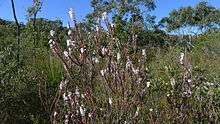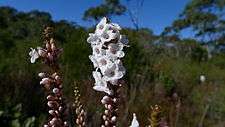Epacris microphylla
| Coral heath | |
|---|---|
 | |
| Epacris microphylla growing in the Royal National Park. | |
| Scientific classification | |
| Kingdom: | Plantae |
| Clade: | Angiosperms |
| Clade: | Eudicots |
| Clade: | Asterids |
| Order: | Ericales |
| Family: | Ericaceae |
| Genus: | Epacris |
| Species: | E. microphylla |
| Binomial name | |
| Epacris microphylla R.Br. | |
Epacris microphylla , commonly known as coral heath, is a plant in the heath family Ericaceae and which is endemic to eastern Australia. It is a common, wiry shrub with tiny leaves that are often obscured by the flowers, especially near the ends of the stems. The plant sometimes grows in dense groups, giving the effect of a snowfall.
Description
Coral heath is an erect, wiry shrub with rod-like stems and angled branches, usually growing to a height of 1 metre (3 ft). The leaves are about 2.0–3.5 millimetres (0.08–0.1 in) long and wide, concave and egg-shaped to almost circular and sharply pointed but not prickly.[1][2][3]
The flowers are arranged singly in the axils of as many as 90 of the upper leaves, often almost covering 40 centimetres (20 in) of the ends of the branches. The petals form a tube with spreading lobes 1.5–2.0 millimetres (0.06–0.08 in) long and are white with five red anthers visible in the centre. Flowers are present for most of the year, but the main flowering period is July to November.[2][3]

Taxonomy and naming
Epacris microphylla was first formally described by Robert Brown in 1810 and the description was published in Prodromus Florae Novae Hollandiae.[4][5] The specific epithet (microphylla) is derived from the Ancient Greek words mikros meaning "small" or "little"[6]:488 and phyllon meaning "leaf".[6]:466 Epacris microphylla var. rhombifolia, or mountain coral heath, is now classed as a distinct species Epacris rhombifolia.[7]
Distribution and habitat
Coral heath grows in heathland in moist, rocky areas and in forest areas. It occurs in coastal areas in Queensland, New South Wales and Victoria, often in poor, sandy soils.[2] It is also only known in a single locality in New Zealand, on the southern shore of the Manukau Harbour, near Auckland.[8]
Use in horticulture
Epacris microphylla is an attractive and hardy garden plant as long as it is grown in well-drained soil. It is difficult to propagate from seed but can be grown from semi-hard tip cuttings.[9][10][11]
References
- ↑ Les Robinson - Field Guide to the Native Plants of Sydney, ISBN 978-0-7318-1211-0 page 107
- 1 2 3 Brown, E. (1990). "Epacris microphylla R.Br.". Plantnet - New South Wales Flora Online. Royal Botanic Gardens, Sydney. Retrieved 22 November 2015.
- 1 2 "Epacris microphylla var. microphylla". Friends of Lane Cove National Park. Retrieved 22 November 2015.
- ↑ "Epacris microphylla". APNI. Retrieved 25 December 2016.
- ↑ Brown, Robert (1810). Prodromus Florae Novae Hollandiae:. London: Typis R Taylor, veneunt apud J. Johnson. p. 550. Retrieved 22 November 2015.
- 1 2 Brown, Roland Wilbur (1956). The Composition of Scientific Words. Washington, D.C.: Smithsonian Institution Press.
- ↑ Brown, E. (1990). "Epacris rhombifolia (L.R.Fraser & Vickery) Crowden". Plantnet - New South Wales Flora Online. Royal Botanic Gardens, Sydney. Retrieved 22 November 2015.
- ↑ G. B Hetley (1888). The Native Flowers of New Zealand: Illustrated in Colours in the Best Style of Modern Chromo-litho Art. Hansebooks. ISBN 978-3-7411-7613-5.
- ↑ Wrigley, John W.; Fagg, Murray (1983). Australian native plants : a manual for their propagation, cultivation and use in landscaping (2nd ed.). Sydney: Collins. pp. 113–114. ISBN 0002165759.
- ↑ "Epacris microphylla". Sydney Water. Retrieved 22 November 2015.
- ↑ Patrick, John. "Fact sheet: Heaths". Australian Broadcasting Corporation, Gardening Australia. Retrieved 22 November 2015.